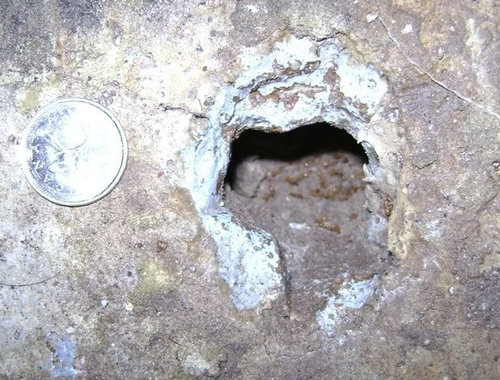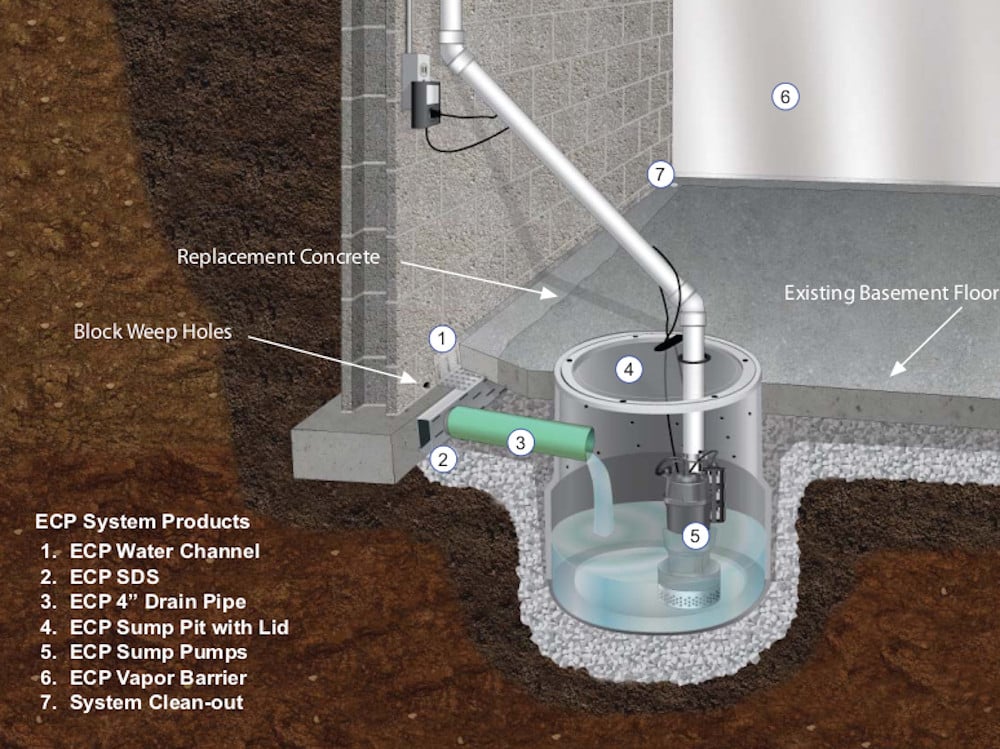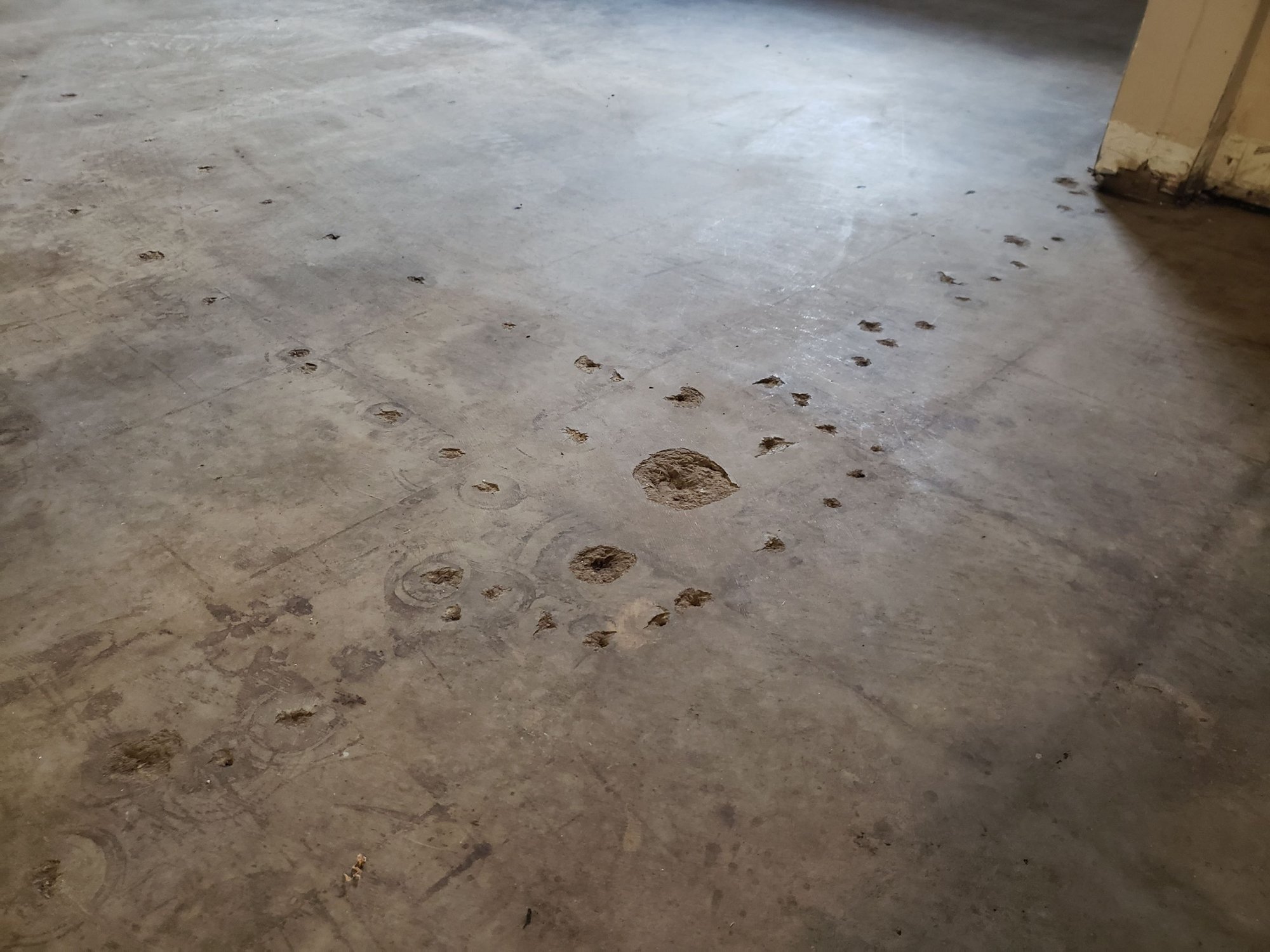Causes and Prevention of a Hole in a Concrete Basement Floor
A hole in a concrete basement floor can be a frustrating and potentially dangerous issue for homeowners. Understanding the causes of these holes and taking preventative measures can save you from costly repairs and ensure the safety of your basement. Here are some common causes of holes in concrete basement floors and provide tips on how to prevent them.
- Poor Construction Techniques: One of the main causes of holes in concrete basement floors is poor construction techniques. This could include inadequate mixing of concrete, improper curing, or insufficient reinforcement. When these factors are not properly addressed during construction, it can lead to weak spots in the floor that eventually develop into holes.
- Water Damage: Water damage is another common cause of holes in concrete basement floors. When water seeps into the basement, it can weaken the concrete over time, leading to cracks and eventually holes. This can be caused by poor drainage systems, leaks from plumbing fixtures, or improper waterproofing.
- Settling and Shifting: Settling and shifting of the soil beneath the basement can also result in holes in the concrete floor. Over time, the ground may shift due to changes in moisture content, temperature fluctuations, or natural geological processes. This movement can put stress on the concrete, causing cracks and holes to form.
Prevention Tips:
- Ensure proper construction techniques are followed during the initial construction of the basement floor.
- Implement a comprehensive waterproofing system to prevent water damage.
- Regularly inspect and maintain the drainage system around your home to prevent water seepage.
- Monitor the moisture levels in the soil around your basement and take appropriate measures to prevent excessive settling.

Repairing a Hole in a Concrete Basement Floor
Discovering a hole in your concrete basement floor can be alarming, but with the right knowledge and tools, you can repair it yourself. We will provide a step-by-step guide on how to repair a hole in a concrete basement floor, helping you restore the floor’s integrity and prevent further damage.
Gather the necessary tools and materials: Before you begin the repair process, gather the following tools and materials: safety goggles, gloves, a chisel, a hammer, a wire brush, a concrete patching compound, a trowel, and a concrete sealer.
Prepare the hole: Clean the hole thoroughly using the wire brush to remove loose debris and any remaining dust. Use the chisel and hammer to widen the hole slightly, creating a V-shape to allow better adhesion of the patching compound.
Mix and apply the patching compound: Follow the instructions on the packaging to mix the concrete patching compound. Apply the compound to the hole, making sure to fill it completely. Smooth the surface using a trowel, ensuring it is level with the surrounding floor.
Allow the patch to cure: Give the patching compound sufficient time to cure. Follow the manufacturer’s instructions for the specific curing time required. It is essential to avoid walking on the repaired area until the compound has fully cured.
Apply a concrete sealer: To provide additional protection and prevent future damage, apply a concrete sealer to the repaired area. Follow the manufacturer’s instructions on the sealer packaging for the application process.
Regularly inspect and maintain the repaired area: After completing the repair, regularly inspect the area for any signs of new damage or deterioration. Address any issues promptly to prevent further damage and ensure the long-term integrity of your basement floor.
Signs of a Hole in a Concrete Basement Floor
Detecting a hole in a concrete basement floor early on is crucial for preventing further damage and ensuring the safety of your home. We will discuss the signs to look for that indicate the presence of a hole in a concrete basement floor. By being aware of these signs, you can take prompt action and address the issue before it worsens.
Visible Cracks: One of the most obvious signs of a hole in a concrete basement floor is the presence of visible cracks. These cracks may start small and gradually widen over time. Look for cracks that are wider than a hairline and extend across the floor. Cracks that are accompanied by gaps or separation in the concrete are indicative of a hole beneath the surface.
Uneven or Sinking Floor: If you notice that your basement floor feels uneven or appears to be sinking in certain areas, it could be a sign of a hole beneath the surface. Walk around the basement and pay attention to any noticeable changes in the floor’s level. Use a level tool to check for discrepancies in different areas.
Water or Moisture Accumulation: Water or moisture accumulation on the basement floor is another sign of a hole. If you consistently find puddles or damp spots in specific areas, it may indicate that water is seeping through a hole in the concrete floor. This could be a result of water entering from below the floor or through cracks in the foundation.
Foul Odor: An unpleasant and musty odor in the basement can be an indication of a hole in the concrete floor. Holes can provide a pathway for moisture, mold, and mildew to accumulate, leading to a distinct smell. If you notice a persistent odor that cannot be attributed to other factors, it’s worth investigating the possibility of a hole.
Structural Instability: In extreme cases, a hole in a concrete basement floor can cause structural instability in the surrounding area. If you notice walls or pillars leaning or shifting, it could be a sign of a significant hole beneath the floor. Structural instability requires immediate attention from a professional to ensure the safety of the building.
Safety Considerations When Dealing with a Hole in a Concrete Basement Floor
When facing a hole in a concrete basement floor, it’s essential to prioritize safety during the repair or assessment process. We will discuss important safety considerations to keep in mind when dealing with a hole in a concrete basement floor. By following these guidelines, you can ensure your well-being and minimize the risk of accidents.
Wear Personal Protective Equipment (PPE): Before starting any work on the hole, make sure to wear appropriate personal protective equipment (PPE) to safeguard yourself. This includes safety goggles to protect your eyes from flying debris, gloves to shield your hands, and a dust mask to prevent inhalation of dust particles. If using power tools, consider wearing ear protection as well.
Evaluate Structural Stability: Before attempting any repairs or assessments, it is crucial to evaluate the structural stability of the area surrounding the hole. Look for signs of significant damage or shifting, such as cracks in walls or pillars. If you suspect structural instability, it is best to consult a professional before proceeding further.
Ensure Proper Ventilation: Working in a basement with poor ventilation can result in the accumulation of harmful fumes or dust particles. Open windows or use fans to improve air circulation while working. If using chemical compounds or sealants, follow the manufacturer’s instructions on proper ventilation requirements.
Secure the Work Area: Create a safe work environment by securing the work area. Remove any objects or furniture that may obstruct your movement or become damaged during the repair process. Surround the area with caution tape or barriers to prevent accidental access by others.
Use Proper Tools and Techniques: Ensure you have the appropriate tools for the job and use them correctly. Avoid using damaged or faulty equipment, as it can pose a safety risk. Follow proper techniques when operating tools, such as chisels or hammers, to minimize the chance of injury.
Seek Professional Help if Necessary: If you are unsure about your ability to safely handle the repair or assessment of a hole in a concrete basement floor, it is best to seek professional help. Professional contractors have the knowledge, experience, and specialized equipment to handle such tasks safely and effectively.
Hiring a Professional vs. DIY
When faced with a hole in a concrete basement floor, one important decision to make is whether to hire a professional or attempt a do-it-yourself (DIY) repair. Let’s explore the pros and cons of each option to help you determine which is best for fixing a hole in a concrete basement floor.
Hiring a Professional:
Hiring a professional contractor to fix a hole in a concrete basement floor offers several advantages. Professionals have the expertise and experience to assess the extent of the damage accurately and determine the most effective repair method. They are equipped with specialized tools and equipment, ensuring a high-quality and long-lasting repair. Professionals also have in-depth knowledge of building codes and regulations, ensuring compliance with safety standards.
However, hiring a professional does come with a cost. Professional services can be expensive, depending on the size and complexity of the repair. Additionally, scheduling and coordinating with a contractor may take time, which could delay the repair process.
DIY Repair:
Opting for a DIY repair can be a cost-effective solution for fixing a hole in a concrete basement floor. It allows you to save money on labor costs and gives you a sense of accomplishment in completing the repair yourself. DIY repairs can be suitable for smaller and less complex holes that require minimal expertise.
However, there are risks and limitations to consider with a DIY approach. Without proper knowledge and experience, you may not be able to accurately assess the extent of the damage or choose the most appropriate repair method. Inadequate repairs can lead to further damage or the need for professional intervention down the line. DIY repairs also require time, effort, and the right tools, which may not be readily available to everyone.
Considerations for Decision-making:
When deciding between hiring a professional or attempting a DIY repair, consider the following factors:
- Size and Complexity: Assess the size and complexity of the hole. Larger or more complex holes may require professional expertise to ensure a proper and durable repair.
- Skill and Experience: Evaluate your own skill level and experience in concrete repairs. If you have little to no experience, it may be safer and more efficient to hire a professional.
- Time and Resources: Consider the time and resources you have available for the repair. DIY repairs require research, planning, and potentially acquiring the necessary tools and materials.
- Budget: Evaluate your budget for the repair. Hiring a professional may be more expensive upfront but can provide long-term value and peace of mind.
Deciding between hiring a professional or attempting a DIY repair for fixing a hole in a concrete basement floor depends on various factors such as size, complexity, skill level, time, resources, and budget. While DIY repairs can be cost-effective for small and simple holes, larger or more complex repairs may require professional expertise to ensure a durable and safe solution. Carefully evaluate your situation and make an informed decision that aligns with your capabilities and priorities.
concrete – How can I repair this small hole in my basement floor
So I now have a hole in my basement floor – DoItYourself.com
What is this hole in the basement floor?? DIY Home Improvement Forum
What is this 2″ Diameter Hole in Basement Foundation Floor? – Home
What are Basement Weep Holes? – My Foundation Repair
Repairing basement concrete holes – DoItYourself.com Community Forums
What is the square hole in basement floor? DIY Home Improvement
Related Posts:
- Basement Floor Color Ideas
- Rubber Flooring For Basement
- How To Clear A Basement Floor Drain
- Basement Floor Covering Ideas
- Acid Wash Basement Floor
- Best Flooring For Concrete Basement Floor
- Insulation Under Basement Floor
- Stone Basement Floor
- Basement Floor Leveling Options
- Basement Flooring Options Inexpensive







